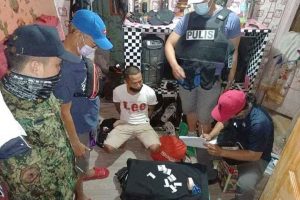MORE than 500 top Philippine police officials have quit, heeding a call to cleanse their ranks of the “deep infection” of the illegal drug trade.
About 60% of these third-level officers have filed their resignation and more from the provinces are expected to follow, police spokesman Colonel Jean S. Fajardo told a news briefing on Monday.
The Philippine National Police (PNP) expect about a thousand senior cops to quit in response to a call by Interior and Local Government Secretary Benjamin C. Abalos Jr.’s quit call last week, she added. A five-man committee will review the resignations and evaluate each cop.
“We’re waiting for the five-man team to be completed so the evaluation and assessment can start so that once and for all, the ranks of our national police could be cleansed,” Ms. Fajardo said in Filipino.
The PNP wants the committee to judge fast and fairly. “The evaluation should be free of personal biases so that it will be acceptable not just to PNP officials but also to the Filipino public,” she added.
Among those who have resigned were national police chief General Rodolfo S. Azurin, Jr. and National Capital Region Police Office (NCRPO) Regional Director Jonnel C. Estomo.
Senior police officials in Metro Manila, Central and Eastern Visayas have also submitted their resignation letters.
“We started a crusade because we believe no PNP personnel should be involved in the use, possession, manufacturing, trade and sale of illegal drugs,” Mr. Azurin told a separate news briefing in Filipino that was streamed live on Facebook.
He said he had recommended to the president that the committee be composed of people outside the police and Department of Interior and Local Government to ensure fairness. Baguio City Mayor Benjamin B. Magalong will be part of the body that will scrutinize top cops, he added.
President Ferdinand R. Marcos, Jr. last week said the Interior secretary’s call was part of his plan to solve the country’s illegal drug problem.
“We have to identify who’s really involved and who are the cops who cannot render police service because they are associated with drug lords,” he told a press briefing streamed live on Facebook.
But human rights experts at the weekend said the Marcos government should enforce the law and prosecute top generals with illegal drug links instead of asking them to quit.
“Courtesy resignations will not solve anything,” Ephraim B. Cortez, president of the National Union of People’s Lawyers, said in a Viber message. “Those involved in drugs within the Philippine National Police’s (PNP) ranks should be investigated, publicly identified and prosecuted.”
‘IMPUNITY’Fides M. Lim, a human rights advocate and convenor of the political prisoner group Kapatid, earlier said the quit call would probably foster impunity.
“Name names, suspend and investigate the top law enforcers who have become the most notorious lawbreakers,” she said in a Facebook Messenger chat.
Mr. Abalos on Wednesday said filing cases against ranking police officers would take too long and delay accountability.
Justice Secretary Jesus Crispin C. Remulla in November vowed to prosecute more top-level police officers responsible for drug war killings.
He said he wanted to extend the Witness Protection Program to police officers who are willing to testify on extralegal killings committed under the anti-illegal drug campaign.
At least 25 policemen have been charged with murder in connection with Mr. Duterte’s anti-illegal drug campaign, Mr. Remulla told the UN Human Rights Council in November. An inter-agency task force on extralegal killings had investigated at least 17,000 cops.
Data released by the Philippine government in June 2021 showed that at least 6,117 suspected drug dealers had been killed in police operations. Human rights groups estimate that as many as 30,000 suspects died.
“Instead of enforcing the law, Mr. Abalos is in fact aggravating impunity by protecting these top hoodlums in uniform who are made to tender courtesy resignations while 12,000 to 30,000 victims of ex-President Rodrigo R. Duterte’s failed drug war still cry out for justice,” Ms. Lim said.
Mr. Abalos earlier said those who submit courtesy resignations could continue working while their records were assessed by the committee. The resignation of those found questionable would be accepted.
“If you’re not involved, there’s nothing to worry about,” he told a news briefing on Wednesday, adding that those who refuse to quit were deemed “questionable.” “This is the only way to cleanse the ranks in a fast manner.”
“It’s difficult to fight a war when it’s your ally that will shoot you in the back,” he added.
He said law enforcers had seized about P10 billion worth of illegal drugs in 24,000 drug operations last year. About 30,000 drug suspects were arrested in the first 100 days of Mr. Marcos.
Police had killed 46 drug suspects during illegal drug operations under the new administration, Mr. Azurin, who was appointed police chief in August, said in November.
Mr. Marcos told police in August to temper their use of force while enforcing the law. Mr. Abalos said in July the drug war would be “as intensive as before.”
The Philippines accepted more than 200 recommendations from the United Nations Human Rights Council in November, investigating extralegal killings during its deadly drug war.
More than 30 member-states of the UN body urged the Marcos administration to do something about the extralegal killings and rights abuses in its anti-illegal drug campaign. — John Victor D. Ordoñez and Norman P. Aquino
